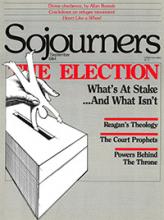A lot of theology is being proclaimed from the presidential pulpit these days. Ronald Reagan is stumping across the country in his drive for re-election. With increasing frequency, the president is invoking the name of God and using explicit religious language in his political campaign.
The New York Times reported back in March that the Reagan campaign was attempting "to make the religion issue the early cornerstone of his re-election drive." The president's 1984 State of the Union speech contained 10 references to God, and God was mentioned 24 times in his election-year address to the National Association of Religious Broadcasters.
Ronald Reagan is making a very direct appeal to the burgeoning constituency of conservative evangelicals and fundamentalists. He has completely allied himself with the new Christian Right and its television preachers. It seems to be a very happy relationship on all sides, one that all parties seem to believe will be politically advantageous.
But an abundance of religious language does not a good theology make. Ronald Reagan, like all of us, has the right to voice his religious views. His public office does not take away that right. But, like all theology, presidential theology can and should be tested and held up to the light of biblical scrutiny.
What is his religion and who is the God being espoused by the most powerful political ruler in the world today? What is the character and quality of Ronald Reagan's theology? Such questions are hardly inappropriate. In fact the biblical tradition has historically cast a suspicious eye at the kind of religion and theology usually promulgated by places like the Oval Office.
Read the Full Article

